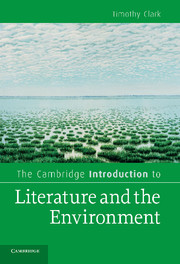Book contents
- Frontmatter
- Contents
- List of illustrations
- Preface
- Acknowledgements
- Introduction
- Romantic and anti-romantic
- Chapter 1 Old world romanticism
- Chapter 2 New world romanticism
- Chapter 3 Genre and the question of non-fiction
- Chapter 4 Language beyond the human?
- Chapter 5 The inherent violence of western thought?
- Chapter 6 Post-humanism and the ‘end of nature’?
- The boundaries of the political
- Science and the struggle for intellectual authority
- The animal mirror
- Notes
- Further reading
- Index
- Cambridge Introductions to …
Chapter 5 - The inherent violence of western thought?
Published online by Cambridge University Press: 05 June 2012
- Frontmatter
- Contents
- List of illustrations
- Preface
- Acknowledgements
- Introduction
- Romantic and anti-romantic
- Chapter 1 Old world romanticism
- Chapter 2 New world romanticism
- Chapter 3 Genre and the question of non-fiction
- Chapter 4 Language beyond the human?
- Chapter 5 The inherent violence of western thought?
- Chapter 6 Post-humanism and the ‘end of nature’?
- The boundaries of the political
- Science and the struggle for intellectual authority
- The animal mirror
- Notes
- Further reading
- Index
- Cambridge Introductions to …
Summary
An understanding of language as a decisive human environment also marks the arguments to which we now turn. What if it emerged that general and even commonsense assumptions and language in the West about what it means to understand, know or interpret something – anything – were implicitly violent and in some ways destructive of their object? Such a dysfunction would pervade the workings of thought, speech and practice everywhere and it would obviously form a major element in the current environmental crisis. This seems an extreme claim, but it is one made and defended by the German thinker Martin Heidegger (1889–1976), the one incontestably major philosopher of the twentieth century whose work has been intimately connected with environmental thinking.
Heidegger's claim is that the course of European and increasingly global history has been largely determined as the hitherto unseen working out of utterly basic but unconsidered modes of thinking and being, dating back to ancient Greece. These are now culminating in a global techno-scientific civilisation that Heidegger saw as a threat not just to the earth itself but also to the essence of humanity, for such a ‘civilisation’ has proved perfectly capable of regarding people as merely another economic resource or even a waste product.
- Type
- Chapter
- Information
- Publisher: Cambridge University PressPrint publication year: 2011



